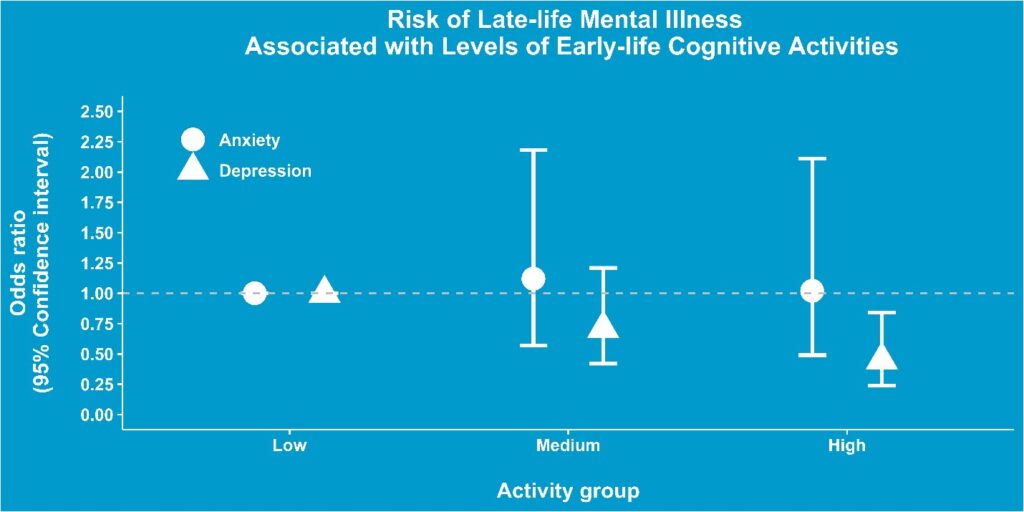Early-life participation in cognitively stimulating activities and risk of depression and anxiety in late life
Article link: https://www.cambridge.org/core/journals/psychological-medicine/article/abs/earlylife-participation-in-cognitively-stimulating-activities-and-risk-of-depression-and-anxiety-in-late-life/13EBAB950230454090134C8685C87B06
Reference: Qiu, X., Roberts, A.L., McAlaine, K.A., Quan, L., Mangano, J., & Weisskopf, M.G. (2023). Early-life participation in cognitively stimulating activities and risk of depression and anxiety in late life. Psychological Medicine, 1-9. doi:10.1017/S0033291723002702
Study question: Is participation in cognitively stimulating activities in early life associated with lower risk of mental illness in late adulthood?
What the Science Says
- Of the 2,187 survey respondents as of 25 March 2022, we identified 84 probable depression cases (3.8%) and 58 probable anxiety cases (2.7%) based on scores from the Patient Health Questionnaire-9 (PHQ-9) and Generalized Anxiety Disorder Screener-7 (GAD-7).
- We measured the level of participation in cognitive activities in early life (at age 6, 12, and 18) covering aspects of reading, writing, playing board games, visiting libraries, etc., and scored them into a 5-point scale from least frequent (1) to most frequent (5). Early-life cognitive activity score was then averaged across the three age periods.
- We found that people in the highest third of childhood cognitive activity level had roughly half the chance of late-life depression as those in the lowest third after accounting for their age, sex, race, parental education, childhood family structure, and socioeconomic status.
- We did not find an association between childhood cognitive activity and late-life anxiety.
- Possible mechanisms explaining the observed protective associations between early-life cognitive activity participation and late-life mental health may involve these activities acting as part of positive childhood experiences (PCEs), building life-long social networks via shared experiences with family members, friends, peers, and mentors, mentalizing and promoting cognitive functions. But, it is also possible that cognitive activity in childhood has direct effects on the brain that last into later life and protect against depression.
- This study suggests that building community-based access to childhood cognitive activities and improving parental awareness of their importance could be potential early-life interventions for late-life depression.
Figure

* An odds ratio (OR) is a measure of association between an exposure and an outcome. It represents the odds that an outcome will occur given a particular exposure, compared to the odds of the outcome occurring in the reference group (low activity group based on thirds of the early-life cognitive activity score). This figure shows that in the high activity group, the chance of depression is half that of the low activity group. However, the chance of anxiety is not significantly different between low and high activity groups.